|
|
|
Sort Order |
|
|
|
Items / Page
|
|
|
|
|
|
|
| Srl | Item |
| 1 |
ID:
169548
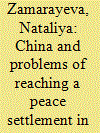

|
|
|
|
|
| Summary/Abstract |
This article analyzes China's position on reaching a settlement on the crisis in Afghanistan. The dynamic of Beijing's approach is described with allowance for inter-Afghan and regional challenges: strengthening the armed opposition in Afghanistan, its influence on the Muslim Uighurs of Xinjiang, and strengthening the strategic partnership between the United States and India in the region. The year 2015, when Beijing and Islamabad signed an agreement to create a China-Pakistan economic corridor (CPEC), was a landmark for the region.
|
|
|
|
|
|
|
|
|
|
|
|
|
|
|
|
| 2 |
ID:
127081
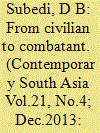

|
|
|
|
|
| Publication |
2013.
|
| Summary/Abstract |
Although combatants played a vital role in the People's War (PW) waged by the Maoists in Nepal, there is a dearth of knowledge about what motivated or compelled people to join the war, as well as what made the Maoists so successful in recruiting and mobilising committed insurgents. Engaging with these questions, this paper aims to understand the causes and drivers of combatant recruitment in the PW. The existing literature demonstrates that armed recruitment and participation in conflict is a phenomenon driven by structural and environmental factors in addition to other conditions, including class-based oppression as well as caste and ethnic grievances. This study, however, contends that in the Nepalese context, while such structural inequalities and disparities created favourable conditions for the PW to escalate, these factors alone cannot sufficiently explain: (a) how and in what ways the Maoists radicalised people or coerced them into becoming combatants and (b) what role the insurgent organisation and the state played in the recruitment dynamics. It argues that an understanding of armed recruitment and participation in the PW should also take into account certain mobilising factors, such as the Maoists' ideology and radicalisation campaigns. Furthermore, it situates the recruitment of combatants within the security paradigm and establishes that the insecurity and violence, caused by both the insurgent organisation and the state, explain voluntary as well as involuntary modes of armed recruitment in the PW.
|
|
|
|
|
|
|
|
|
|
|
|
|
|
|
|
| 3 |
ID:
107643
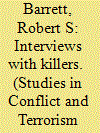

|
|
|
|
|
| Publication |
2011.
|
| Summary/Abstract |
Interviews conducted with leaders, combatants, witnesses, and victims in central Nigeria provide insight into the processes of volunteerism, recruitment, and indoctrination within armed groups. Identified are numerous avenues by which previously nonviolent citizens become willing perpetrators in deadly grass-roots conflict. Despite a commonly advertised motive for joining, narrative analyses reveal several diverse and underlying motivations. Six distinct combatant typologies are described: the Follower, the Pragmatist, the Criminal, the Soldier, the Basic Needs, and the Ideologue. The characteristics of each type, the timing of their entry into the conflict, and the implication for select intervention strategies are discussed.
|
|
|
|
|
|
|
|
|
|
|
|
|
|
|
|
| 4 |
ID:
069843
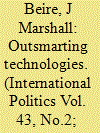

|
|
|
| 5 |
ID:
156745
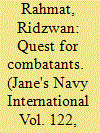

|
|
|
| 6 |
ID:
172199
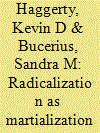

|
|
|
|
|
| Summary/Abstract |
The process whereby individual terrorists radicalize into violent extremism is typically understood as involving a series of individual mechanisms (e.g., grievance, attachment to friends, thrill), group processes (e.g., competition, social cohesion), and mass-public mechanisms. In this article, we demonstrate that this process is actually better understood as one of “martialization,” applicable to varying degrees to conventional and unconventional soldiers alike. We detail these commonalties via an analysis of six key themes in the literature: a) a sense of vicarious injustice, b) a sense of belonging/identity, c) meaning, excitement, and glory, d) active recruitment, e) indoctrination, and f) group solidarity. Lastly, we suggest why scholars have previously been blind to these parallels. By not recognizing the similarities, we are missing out on the opportunity to mobilize our entire existing knowledge base (on conventional and unconventional soldiers) for creating useful policies for countering violent extremism.
|
|
|
|
|
|
|
|
|
|
|
|
|
|
|
|
| 7 |
ID:
072988
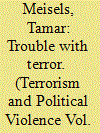

|
|
|
|
|
| Publication |
2006.
|
| Summary/Abstract |
This essay warns against a recent philosophical confusion concerning the definition of "terrorism," which has dominated the post 9/11 literature. Terrorism, it is suggested, is nothing but the intentional random murder of defenseless non-combatants, with the intent of instilling fear of mortal danger amidst a civilian population as a strategy designed to advance political ends. Furthermore, this essay argues that regardless of its "root cause," terrorism is diametrically opposed to the requirements of liberal morality and can only be defended at the expense of relinquishing the most basic of liberal commitments.
|
|
|
|
|
|
|
|
|
|
|
|
|
|
|
|
| 8 |
ID:
114476
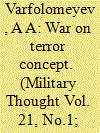

|
|
|
|
|
| Publication |
2012.
|
| Summary/Abstract |
The author retraces the evolution of the "war on terror" concept, from its inception following the events of September 11, 2001 to the present day. He points to the inappropriate use of this concept for the United States' special operations in Afghanistan and, to an extent, in Iraq. He also offers an analysis of where these operations can lead in the context of modern international law and interests of Russian foreign policy.
|
|
|
|
|
|
|
|
|
|
|
|
|
|
|
|
|
|
|
|
|